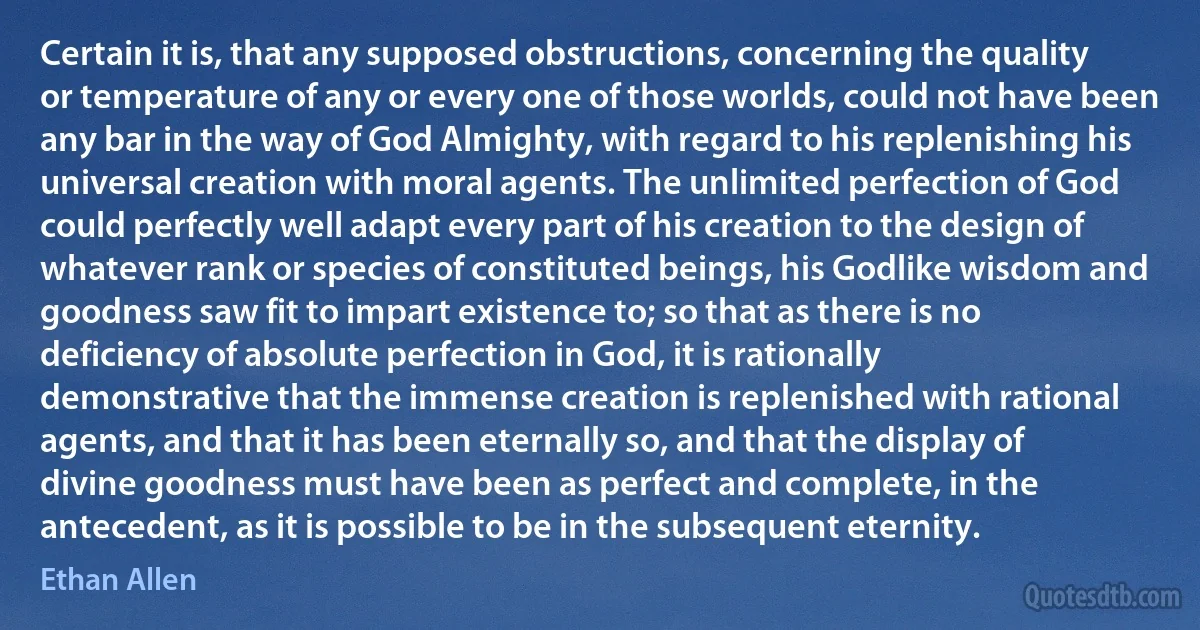Demonstrative Quotes
As I search the archives of my memory I seem to discern six types or methods which divide themselves from one another with measurable distinctness. There is the type magisterial or imperative; the type laconic or sententious; the type conversational or homely; the type refined or artificial, smelling of the lamp, verging at times upon preciosity or euphuism; the demonstrative or persuasive; and finally the type tonsorial or agglutinative, so called from the shears and the pastepot which are its implements and emblem.

Benjamin N. Cardozo
It was around 1935 or 1936 that I first had the idea of compiling a history of art – not in the usual way, but considering only the fads that have succeeded one another down through the ages. For example, the infatuation in Roman times with broken pleats and heads turned in profile.... or during the epoch of Pérugin and Raphael, a certain blue that appears everywhere. I wanted to draw up an inventory of these vogues. To this end I visited museums, took notes in little notebooks, and made demonstrative sketches of paintings. For this purpose I preferred bad paintings, by which I mean those held to be mediocre by aesthetes, but in which these fads that interested me were clearly in evidence.

Jean Dubuffet
The result of the mathematician's creative work is demonstrative reasoning, a proof; but the proof is discovered by plausible reasoning, by guessing. If the learning of mathematics reflects to any degree the invention of mathematics, it must have a place for guessing, for plausible inference.

George Pólya
Everyone knows that mathematics offers an excellent opportunity to learn demonstrative reasoning, but I contend also that there is no other subject in the usual curricula of the schools that affords a comparable opportunity to learn plausible reasoning. ...let us learn proving, but also let us learn guessing.

George Pólya
Four handsome, naked, female dancers separate themselves from the crowd in Prospero's cloak... and they dance. From now on -- they become Prospero's dancers -- they mark out a four-figured symmetrical space around him -- dancing in perfect unison -- a strange, prancing, high-stepping, complicated, frankly sensuous dance -- danced with great firmness and confidence -- their eroticism is aimed only at themselves -- no mincing or quarter given -- their erotic confidence is demonstrative and challenging.

Peter Greenaway
The subversive character of truth inflicts upon thought an imperative quality. Logic centers on judgments which are, as demonstrative propositions, imperatives, - the predicative "is” implies an "ought.” ... Verification of the proposition involves a process in fact as well as in thought: (S) must become that which it is. The categorical statement thus turns into a categorical imperative; it does not state a fact but the necessity to bring about a fact. For example, it could be read as follows: man is not (in fact) free, endowed with inalienable rights, etc., but he ought to be.

Herbert Marcuse
The premisses of demonstrative knowledge must be true, primary, immediate, more knowable than and prior to the conclusion, which is further related to them as effect to cause... The premisses must be the cause of the conclusion, more knowable than it, and prior to it; its causes, since we posses scientific knowledge of a thing only when we know its cause; prior, in order to be causes; antecedently known, this antecedent knowledge being not our mere understanding of the meaning, but knowledge of the fact as well. Now 'prior' and 'more knowable' are ambiguous terms, for there is a difference between what is prior and more knowable in the order of being and what is prior and knowable to man. I mean that objects nearer to sense are prior and more knowable to man; objects without qualification prior and more knowable are those further from sense. Now the most universal causes are furthest from sense and particular causes are nearest to sense, and they are thus exactly opposed to each other.

Aristotle
1. We are the contemporaries of a third epoch of science after the Greek and Galilean. The caesura which opens this third epoch is not (a with the Greek) an invention - that of demonstrative mathematics - nor is it (like the Galilean) a break - that which mathematized the discourse of physics. It is a split, through, which the very nature of the base of mathematical rationality reveals itself, as does the character of hte dision of thought which establishes it.

Alain Badiou
We are forced to distinguish between three kinds of speech: (1) The external, "rhetorical speech,” in the common meaning of this expression, which only refers to images because they affect the passions. Since these images do not stem from insight, however, they remain an object of opinion. This is the case of the purely emotive, false speech: "rhetoric” in the usual negative sense. (2) The speech which arises exclusively from a rational proceeding. It is true that this is of a demonstrative character, but it cannot have a rhetorical effect because purely rational arguments do not attain to the passions, i.e., "theoretical” speech in the usual sense. (3) The true rhetorical speech. This springs from the archai, nondeductible, moving, and indicative, due to its original images. The original speech is that of the wise man, of the sophos, who is not only epistetai, but who with insight leads, guides, and attracts.

Ernesto Grassi
Franz Marc.... is more human, he loves more warmly, is more demonstrative.... I only try to relate myself to God, and if I am in harmony with God, I don't fancy that my brothers are not also in harmony with me; but that is their business... My fire is more like that of the dead or the unborn... Art is like Creation: it holds good on the last days as on the first.
What my art probably lacks, is a kind of passionate humanity. I don't love animals and every sort of creature with an earthly warmth... I tend rather to dissolve into the whole of creation and am then on a footing of brotherliness to my neighbour, to all things earthly. I possess. The earth-idea gives way to the world-idea. My love is distant and religious.

Paul Klee
Demonstrative reasoning penetrates the sciences just as far as mathematics does, but it is in itself (as mathematics is in itself) incapable of yielding essentially new knowledge about the world around us. Anything new that we learn about the world involves plausible reasoning, which is the only kind of reasoning for which we care in everyday affairs.

George Pólya



